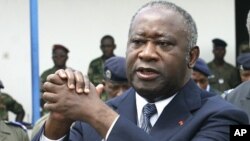Ivory Coast's former ruling party has pulled out of the electoral commission, saying the new government refuses to include opponents in planning for coming parliamentary polls. Ivory Coast's president says he hopes the former ruling party will take part in that vote.
Former President Laurent Gbagbo's party says it is quitting the electoral commission because the government of President Alassane Ouattara is refusing to engage in a dialogue on security, the electoral commission, and preparations for legislative polls.
Ouattara won last year's presidential vote. But Gbagbo refused to give up power, sparking a political crisis that killed at least 3,000 people and ultimately led to Gbagbo's arrest in April. He is now awaiting trial on charges associated with that violence.
Gbagbo's fall divided the Ivorian Popular Front between those determined to defend his legacy and those who felt it better to move on and accept President Ouattara's offer to join a new government. The administration's first big test of political reconciliation comes in legislative elections that are expected some time before December 15.
Gbagbo's party has not yet announced whether it will take part in a vote that President Ouattara says is long overdue.
"I hope they will participate. But we have been delayed too long," said Ouattara. "If they don't want to participate, I told them it would be a mistake. But we can not have the same parliament in place for 12 years. Normally parliament should have been renewed in 2005. It was not. It was to be renewed in 2010. So really it is about time we have a credible parliament."
Speaking in New York this week, President Ouattara says he believes the Gbagbo party is hesitant because it currently holds 100 seats in parliament and knows that number will fall.
"The party of Gbagbo knows they will not get more than 30 or 40 seats, and it will be located in specific areas of the country. They know they will lose credibility," he said. "Everyone will know that Gbagbo was not elected really in 2000, that his party did not represent a majority."
The Ivorian Popular Front's interim president, Laurent Akoun, says there is a "deep divergence" among Ivory Coast's political parties about how best to carry out this vote.




